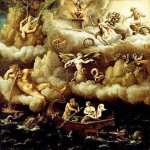Welcome to My Play of Life
Posted on January 21, 2014 by Robert Ringer
Have you ever entertained the thought that you are the only person on earth and that everyone else — family, friends, business associates, and total strangers — are but actors in your play of life? Perhaps I’m just weird, but this thought first struck me when I was about six or seven years old.
Taking it one step further, it seems to me that the world — make that the entire universe — will no longer exist when I’m gone if there is no continuation of Robert Ringer in one form or another after his passing. After all, from my vantage point, the world exists only in my mind and through my senses — i.e., sight, sound, taste, smell, and touch. If I don’t see it, hear it, taste it, smell it, or touch it, for me it doesn’t exist.
Of course, less weird people will argue that after I pass through to the other side, billions of human beings will still be here and will be fully aware of life, the earth, and the universe. Maybe so, but I, personally, will not know that to be a fact if I no longer exist. Therefore, from my perspective, when I die, the entire universe dies.
If you take this to be an extreme case of self-absorption, you’ve missed the point. It has nothing to do with ego or self-centeredness — and certainly not narcissism. It is simply an intellectual deduction based on firsthand observation. The only thing I know for certain is what I see, hear, taste, smell, and touch.
Likewise, in your world you can only know for certain what you see, hear, taste, smell, and touch. This view of life can be loosely referred to as solipsism. Solipsism is the theory that you, and you alone, are the only thing you can know with certainty exists. Put another way, you are the only person on the stage of history.
In effect, then, I have actually created the universe as a result of my consciousness, and I will destroy the universe if and when I am no longer conscious. (I say if, because who knows what awaits me on the other side?) Likewise, if you are actually conscious and aware in the same way that I am (which I cannot prove and which is what makes me wonder if you are nothing more than an actor in a play about my life), then your universe will vanish if and when you cease to exist.
You could therefore make a legitimate argument that if you’re still around after I’m gone, the universe will continue to exist in your mind. And I would have to agree that, in theory, you would be right. Which raises the question of whether the universe really exists at all or if it is nothing more than a figment of each person’s imagination.
Which brings me back to the actors in my play. Perhaps they are really nothing more than figments of my imagination. If so, no one can prove me wrong. After all, a figment doesn’t have the right, or consciousness, to argue with me.
There are scientists and philosophers who believe that the whole idea of solipsism is disproven by the fact that each of us experiences human feelings such as pain, frustration, and disappointment. Their argument is that if I am the only person in existence, why can’t I just use my imagination to bring about a life devoid of all negatives? Why can’t I repress all emotional desires to do things that are harmful to me?
My view is that this argument presumes far too much. Just because I am a conscious conglomeration of atoms that can reflect on itself and discern the world and the universe — and am the only entity that can do so through my senses — does not mean that I am omnipotent. My unique ability to perceive the universe, the world, and life in a way that no one else can perceive them does not automatically confer on me divine attributes.
To look at it in another way, the earth supposedly came into existence about 4.5 billion years ago and Homo sapiens appeared on our little speck of dust in just the last thirty seconds of Carl Sagan’s so-called cosmic calendar (compressing 4.5 billion years into a calendar year). So the question is, how could the universe have existed for all those years when there was presumably no intelligent life to observe it? A solipsist would have his hands full trying to answer that question in a credible way.
To totally twist my brain in knots, I also enjoy throwing the doctrine of pantheism into the mix. Oversimplified, pantheism is the belief that the universe and everything in it comprise God, thus God is not personal. Rather than being a separate entity, he is everything. Which raises another question: Does it logically follow that God created himself?
So how does pantheism square with my perception (illusion?) that I am the only human being on earth and that everyone else is but an actor in my play? Is there a conflict between pantheism and solipsism? Yes, I believe there is. If the universe exists only as a result of my being alive and conscious, then the universe cannot be God.
Of course, if God is personal, that would trump all other theories and doctrines. A personal, omniscient, omnipotent God could have created the universe (Creator), exist in every particle of the universe (pantheism), directly intervene in secular life and the workings of the entire universe (Cosmic Pilot), and could have programed human beings, either through evolution or divine (quick) creation, in such a way that each of us experiences the sentience of being the only human being on earth.
That said, it is also possible that our entire universe is just one of an infinite number of cosmic capsules that house tiny particles we think of as galaxies, stars, planets, asteroids, meteorites, and dust. If so, what would it mean? Honesty compels me to admit that I have no idea.
I’ll turn this one over to you and see what you can come up with. And don’t be afraid of sounding a little weird. We’re in uncharted waters here, so your opinion has as much validity as the opinions of the most renowned scientists and theologians — who know so much that I sometimes wonder if they know anything at all.










